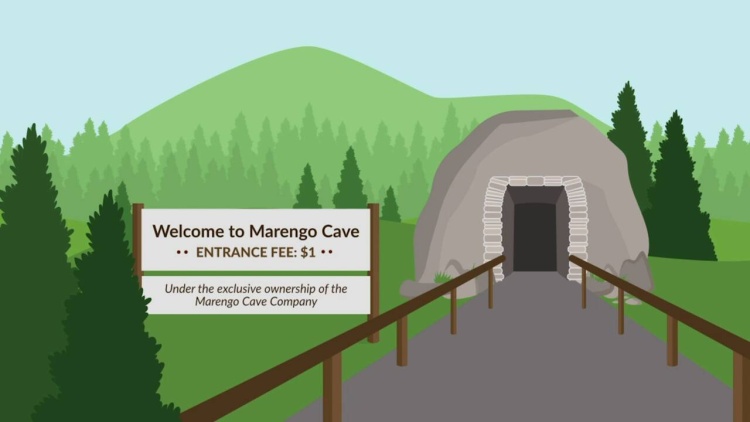Marengo Cave Co. v. Ross
Supreme Court of Indiana
212 Ind. 624, 10 N.E.2d 917 (1937)
- Written by John Yi, JD
Facts
In 1883, some passersby discovered the entrance to what is now Marengo Cave. The Marengo Cave Company (Marengo) (defendant) succeeded the discoverers in title to the land on which the cave entrance was located, and it controlled the entrance and operated the cave as a tourist attraction. Marengo and the prior landowners made improvements within the cave, such as building walkways and widening paths, and charged visitors admission fees to enter and see the cave. Ross (plaintiff) was an adjacent landowner. The entrance to the cave was 700 feet from the boundary between Ross's and Marengo’s land, but a substantial portion of the cave itself was under Ross’s land. Ross sued Marengo to quiet title in the portion of the cave beneath his land. Marengo argued that it had acquired title to the entire cave by adverse possession. The boundaries of the cave as it related to the ground surface were not ascertained until 1932, when the trial court ordered a survey at Ross's request. Until the survey occurred, Marengo Cave was thought to be entirely under Marengo's land. After a trial, the jury returned a verdict for Ross, and the court denied Marengo’s motion for a new trial. Marengo appealed the decision to deny the motion on the ground that the jury verdict was not sustained by sufficient evidence.
Rule of Law
Issue
Holding and Reasoning (Roll, J.)
What to do next…
Here's why 907,000 law students have relied on our case briefs:
- Written by law professors and practitioners, not other law students. 47,100 briefs, keyed to 996 casebooks. Top-notch customer support.
- The right amount of information, includes the facts, issues, rule of law, holding and reasoning, and any concurrences and dissents.
- Access in your classes, works on your mobile and tablet. Massive library of related video lessons and high quality multiple-choice questions.
- Easy to use, uniform format for every case brief. Written in plain English, not in legalese. Our briefs summarize and simplify; they don’t just repeat the court’s language.





